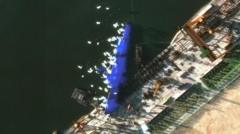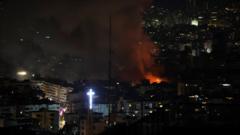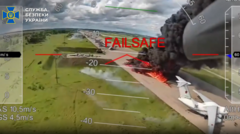On Thursday night, Israeli military forces executed air strikes in southern Beirut's suburbs, claiming to target Hezbollah's drone production capabilities. The strikes occurred shortly after evacuation warnings for several key buildings, which prompted mass exodus from the densely populated area. Local officials condemned the actions, characterizing them as a direct assault on Lebanon's security and sovereignty, particularly troubling as the strikes happened just before a significant religious festival.
Israel Launches Air Strikes in Beirut Ahead of Eid Al Adha

Israel Launches Air Strikes in Beirut Ahead of Eid Al Adha
Israeli air strikes targeted Hezbollah drone facilities in southern Beirut on the eve of the significant Islamic holiday, Eid Al Adha.
Israel initiated this operation despite a six-month ceasefire with Hezbollah, citing the group’s underground drone manufacturing as a pressing threat. The Israeli Defense Forces (IDF) stated that Hezbollah’s drone program was financed by Iranian entities and had expanded significantly. Lebanese leaders voiced strong criticism, with Prime Minister Nawaf Salam labeling the strikes as systematic threats against Lebanon's stability.
The strikes sent thousands of residents fleeing, leading to considerable traffic congestion and underscoring the chaotic atmosphere. Smoke was reportedly seen rising from affected areas, escalating fears among the local populace.
Lebanese President Joseph Aoun condemned the air strikes, emphasizing their timing coincided with a significant religious celebration and decrying them as violations of international accords. Additionally, the United Nations’ Special Coordinator for Lebanon remarked on the strikes’ potential to heighten panic during a sacred time for many Muslims.
Israel's Defense Minister, Israel Katz, asserted the necessity of the strikes to combat Hezbollah’s perceived violations of the ceasefire, claiming that Lebanese governance bore responsibility for controlling militia activities. The military highlighted that Hezbollah's drone operations were pivotal to prior conflicts, marking them as aggressive threats.
The incident marks a sharp escalation in tensions, following a history of heavy conflict between Israeli forces and Hezbollah, which reached a peak between 2023 and 2024. Restrictions imposed by a ceasefire reached in late November, designed to manage the situation, appear to be under significant strain.
This recent escalation illustrates the complex and fragile balance of peace in the region, raising serious concerns about the potential for further conflict in an already volatile situation.
The strikes sent thousands of residents fleeing, leading to considerable traffic congestion and underscoring the chaotic atmosphere. Smoke was reportedly seen rising from affected areas, escalating fears among the local populace.
Lebanese President Joseph Aoun condemned the air strikes, emphasizing their timing coincided with a significant religious celebration and decrying them as violations of international accords. Additionally, the United Nations’ Special Coordinator for Lebanon remarked on the strikes’ potential to heighten panic during a sacred time for many Muslims.
Israel's Defense Minister, Israel Katz, asserted the necessity of the strikes to combat Hezbollah’s perceived violations of the ceasefire, claiming that Lebanese governance bore responsibility for controlling militia activities. The military highlighted that Hezbollah's drone operations were pivotal to prior conflicts, marking them as aggressive threats.
The incident marks a sharp escalation in tensions, following a history of heavy conflict between Israeli forces and Hezbollah, which reached a peak between 2023 and 2024. Restrictions imposed by a ceasefire reached in late November, designed to manage the situation, appear to be under significant strain.
This recent escalation illustrates the complex and fragile balance of peace in the region, raising serious concerns about the potential for further conflict in an already volatile situation.




















